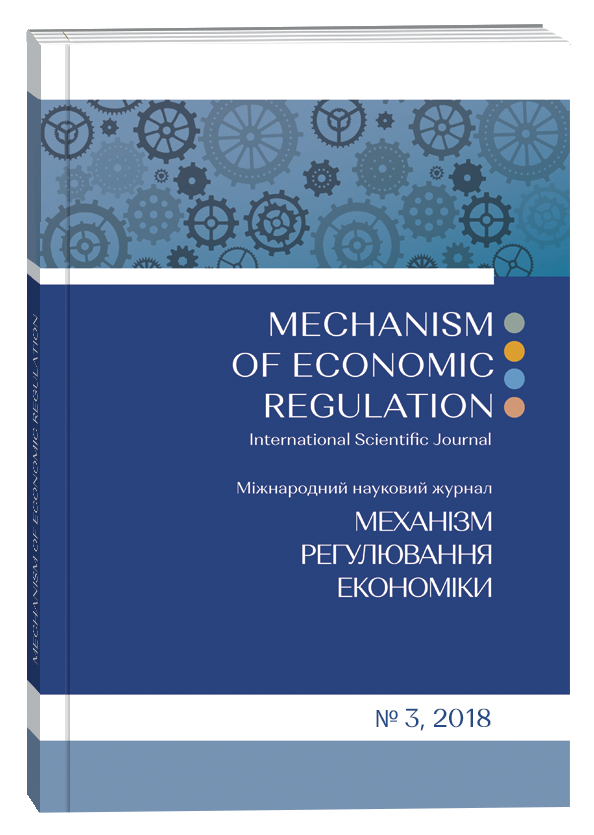ЕФЕКТ КОНКУРЕНТОСПРОМОЖНОСТІ ШЕРИНГОВОЇ ЕКОНОМІКИ. СВІТОВІ І УКРАЇНСЬКІ РЕАЛІЇ
Анотація
У сучасному житті споживання є невід'ємною частиною життя. Однак в останні роки багато дискусій про негативні наслідки зростання споживання через обмежених ресурсів, перенаселення Землі, нерівномірного розподілу природних багатств і зміни клімату. Поінформованість з цих питань отримала відповідь в ряді розвинених країн у вигляді виникнення альтернативної економіки. Принципи економіки засновані на запереченні цінностей споживання і непостійного руху для товарів. Цей тип економіки, званий шеринговою економікою, є соціально-економічною моделлю, де люди мають доступ до колективного споживання. Варто згадати, що наукових робіт, присвячених цьому питанню, недостатньо, і він до цих пір не досліджений. Це пояснює актуальність обраної теми. У статті були проаналізовані основні аспекти народження економіки спільного використання, переваги основних ризиків, пов'язаних з розвитком економіки спільного використання. Ми розглянули і проаналізували основні міжнародні обміни міжнародною практикою і узагальнений досвід України в реалізації проектів спільного використання економіки. Постійно зростає чисельність компаній зі сфери шерингової економіки. Також швидкими темпами зростає капіталізація цих компаній (як приватних так і публічних). Ці компанії також потрапляють до списків найбільш перспективних стартапів і впроваджують інновації у свій бізнес-процес. Компанії цієї сфери все активніше складають конкуренцію лідерам ринків, на яких вони представлені. Можна також сказати, що ці підприємства наново формують ринки і стосунки на них. Виходячи з цих фактів можна сказати що інтерес науки до цієї теми є актуальним. У статті були досліджені головні сфери шерингової економіки на сьогодні і найбільш великі компанії з цих сегментів. Також було проведено дослідження країн, в яких найактивніше розвиваються ці компанії з прогнозуванням росту, також зроблені висновки відносно розвитку цих сегментів, особливо на розвиваючих ринках.
Посилання
Botsman, R. (2012). The currency of the new economy is trust. Retrieved from http://www.ted.com/talks/rachel_botsman_the_currency_of_the_new_economy_is_trust?language=e g.
Botsman, R., Rogers, R. (2010). What’s Mine is Yours: The Rise of Collaborative Consumption. N.Y.: HarperColllins Publishers.
Vitaud, L. (2015). The Gig Economy in Spain: From the Shadow to the Light. Retrieved from https://medium.com/switch-collective/the-gig-economy-in-spain-from-the-shadow-to-the-light- 829e9d9a48cd.
European Commission. (2017). Collaborative economy. Retrieved from http://ec.europa.eu/growth/single-market/services/collaborative-economy_en.
Eurostat. (2017). Online peer-to-peer accommodation services used by 1 in 6 EU citizens. Retrieved from http://ec.europa.eu/eurostat/web/products-press-releases/-/9-20122017-AP.
Fellander, A., Ingram, C., Teigland, R. (2015). The Sharing Economy Embracing Change With Caution. Stockholm: Entreprenörskapsforum.
Yellen, D. (2015). Airbnb, Snapgoods and 12 More Pioneers Of The 'Share Economy'. Retrieved from http://www.forbes.com/pictures/fljh45flh/airbnb-snapgoods-and-12-more-pioneers-of-the- share-economy.
Heinrichs, H. (2013). Sharing economy: A potential new pathway to sustainability. GAIA – Ecological Perspectives for Science and Society, 4(22), 228–231.
ING. (2017). Mobile Banking 2017 – Newer Technologies. Retrieved from https://www.ezonomics.com/ing_international_surveys/mobile-banking-2017-newer-technologies/.
Pricewaterhouse Coopers (PWS). (2017). PwC's Global Annual Review 2017. Retrieved from https://www.pwc.com/gx/en/about/global-annual-review-2017.html.
The Economist. (2013). The rise of the sharing economy. Retrieved from http://www.economist.com/news/leaders/21573104-internet-everything-hire-rise-sharing-economy.
Time Magazine. (2011). 10 Ideas that Will Change the World. Retrieved from http://content.time.com/time/specials/packages/0,28757,2059521,00.html.
Claveria, K. (2015). How to compete with the next Uber: New rules for the collaborative, on- demand, sharing economy. Retrieved from https://www.visioncritical.com/new-rules-in-sharing- economy.


